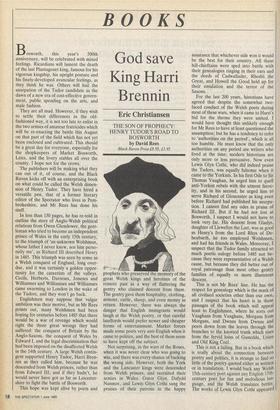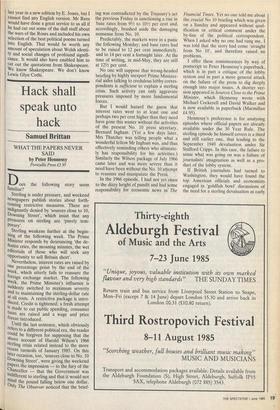BOOKS
God save King Harri Brennin
Eric Christiansen
THE SON OF PROPHECY: HENRY TUDOR'S ROAD TO BOSWORTH by David Rees
Black Raven Press f8.95, £3.95
Bosworth, this year's 500th anniversary, will he celebrated with mixed
feelings. Ricardians will lament the death of the last Plantagenet king, famous for his vigorous kingship, his upright posture and his finely-developed avuncular feelings, as they think he was. Others will hail the usurpation of the Tudor candidate as the dawn of a new era of cost-effective govern- ment, public spending on the arts, and male fashion.
They are all mad. However, if they wish to settle their differences in the old- fashioned way, it is not too late to enlist in the two armies of amateur fratricides which will he re-enacting the battle this August on that part of the field which has not yet been enclosed and cultivated. This should be a great day for everyone, especially for the shopkeepers of Market Bosworth, Leics, and the livery stables all over the county. I hope not for the crows.
The publishers will be making what they can out of it, of course, and the Black Raven kicks off with an enterprising book on what could be called the Welsh dimen- sion of Henry Tudor. They have hired a versatile pen, that of a former literary editor of the Spectator who lives in Pem- brokeshire, and Mr Rees has done his stuff.
In less than 150 pages, he has re-told in outline the story of Anglo-Welsh political relations from Owen Glendower, the gent- leman who tried to become an independent prince of Wales in the early 15th century, to the triumph of 'an unknown Welshman, whose father I never knew, nor him perso- nally me', as Richard III described Henry in 1485. This triumph was seen by some as a Welsh conquest of England, long over- due, and it was certainly a golden oppor- tunity for the careerists of the valleys. Cecils, Herherts, Davieses, Joneses and Williamses and Williamses and Williamses came swarming to London in the wake of the Tudors, and they won't go back.
Englishmen may suppose that vulgar ambition was their motive, but as Mr Rees points out, many Welshmen had been hoping for centuries before 1485 that there would be a war of revenge which would right the three great wrongs they had suffered: the conquest of Britain by the Anglo-Saxons, the conquest of Wales by Edward I, and the legal discrimination that had been imposed on the disaffected Welsh in the 14th century. A large Welsh contin- gent supported Henry Tudor, Harri Bren- nin as they called him, because he was descended from Welsh princes, rather than from Edward III; and if they hadn't, he would never have got as far as Leicester- shire to fight the battle of Bosworth.
This hope was kept alive by poets and prophets who preserved the memory of the great Welsh kings and heroines of the remote past as a way of flattering the gentry who claimed descent from them. The gentry gave them hospitality, clothing, armour, cattle, sheep, and even money in return. However, there was always the danger that English immigrants would laugh at the Welsh poetry, or that careful landlords would prefer newer and cheaper forms of entertainment. Market forces made some poets very anti-English when it came to politics, and the best of them seem to have kept off the subject.
Not surprising, in the wars of the Roses, when it was never clear who was going to win, and there was every chance of backing the wrong side. However, both the York and the Lancaster kings were descended from Welsh princes, and recruited their armies in Wales. Gutor Glyn, Dafydd Nanmor, and Lewis Glyn Cothi sang the praises of their patrons in the happy assurance that whichever side won it would be the best for their country. All these hill-chieftains were sped into battle with their genealogies ringing in their ears and the deeds of Cadwallader, Rhodri the Great, and Howell the Good held up for their emulation and the terror of the Saxons.
For the last 200 years, historians have agreed that despite the somewhat two- faced conduct of the Welsh poets during most of these wars, when it came to Harri's bid for the throne they were united. I would have thought this unlikely enough for Mr Rees to have at least questioned the assumption; but he has a tendency to refer to 'authorities on the period', which is all too humble. He must know that the only authorities on any period are writers who lived at the time; modern historians are only more or less persuasive. Now even Lewis Glyn Cothi, who did indeed praise the Tudors, was equally fulsome when it came to the Yorkists. In his first Ode to Sir Thomas Vaughan, he urged him to quell anti-Yorkist rebels with the utmost feroc- ity, and in his second, he urged him to serve Richard of Gloucester as king even before Richard had published his usurpa- tion. I cannot find any odes in praise of Richard III. But if he had not lost at Bosworth, I suspect I would not have to look very far. His descent from Gladys, daughter of Llewellyn the Last, was as good as Henry's from the Lord Rhys of De- heubarth, he too employed Welshmen, and had his friends in Wales. Moreover, I suspect that the Tudor family attracted so much poetic eulogy before 1485 not be- cause they were representative of a Welsh cause, but because they did better out of royal patronage than most other gentry families of equally or more illustrious descent.
This is not Mr Rees' line. He has the respect for genealogy which is the mark of all civilised societies other than our own, and I suspect that his heart is in those passages of the book which will appeal least to Englishmen, where he sorts out Vaughans from Vaughans, Morgans from Morgans, and Dwnns from Dwnns and peers down from the leaves through the branches to the knotted trunk which rises from the fervid loins of Gunedda, Urien and Old King Cocl.
This is not a failing. But in a book which is really about the connection between poetry and politics, it is strange to find so little of the poetry quoted either as written or in translation. I would back any Welsh
15th-century poet against any English 15th- century poet for fun and melodious lan-
guage, and the Welsh translates better. The works of Lewis Glyn Cothi appeared last year in a new edition by E. Jones, but I cannot find any English version. Mr Rees would have done a great service to us all if he had cut out some of the dull stuff about the wars of the Roses and included his own selection of the best political poems turned into English. That would be worth any amount of speculation about Welsh identi- ty and social changes of profound signifi- cance. It would also have enabled him to cut out the quotations from Shakespeare. We know Shakespeare. We don't know Lewis Glyn Cothi.



















































 Previous page
Previous page